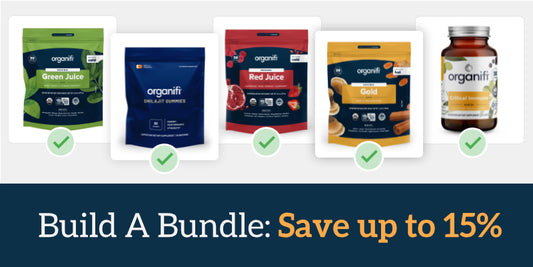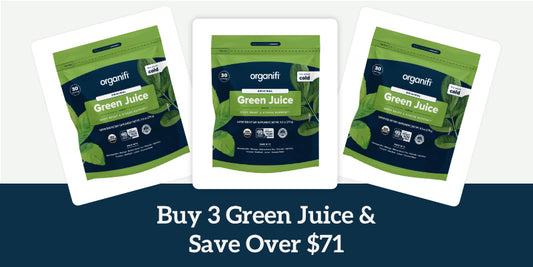If your favorite pair of jeans was fitting you just fine three months ago, but suddenly feel a little tighter around the waistline (and you haven’t really changed routine) you may be experiencing ‘rapid weight gain.’
Ideally, this little shift in your body is temporary.
While a little extra weight never killed anybody - despite what some magazines out there might tell you - keeping an eye on unexplained weight-gain is always a good idea; our bodies are constantly communicating with us, trying to warn us when something’s not right.
Sudden weight gain can be as simple as a little dehydration, or as significant as a hormonal imbalance. Let’s look at ten of the sneakiest rapid weight gain causes and how to fix or prevent them with science.
#1 You’re Not Getting Enough Protein
The Dietary Reference Intake according to the USDA estimates that we need a minimum “0.36 grams of protein per pound of body weight”, which roughly translates to 40-55 grams of protein for the average lightly active, or sedentary, individual on a 2,000 calorie diet.
If you don’t get enough protein, your body breaks muscle tissue for its needs and then slows down your metabolism, making you gain weight.
Conversely, when you up the protein intake - you lose weight!
Studies show that when 25 to 30% of your total daily calories come from protein sources, your metabolism gets a boost - ultimately burning fat. (The science: 1, 2, 3)
Not all proteins are created equal, and we need complete protein to thrive. Complete proteins have all the necessary amino acids that build muscle, boost immunity and process nutrients.
Quinoa, rice and beans, lentils, spirulina (‘superfood’ combined with grains or oats), chia seeds and pumpkin seeds are all excellent examples of complete protein.
Prevent it:
Make sure you’re getting the right amount of protein for your body and lifestyle. Consulting with a nutritionist is always good, but if you want a rough idea use this Free Nutrient Calculator by the USDA.
#2 You Overeat Healthy Foods
I know! How is this a thing? Alas, it is. When we start watching our weight, getting fit and jumping on the health bandwagon, we often tend to unwittingly consume larger portions of healthy fats and carbs because we think that they’re ‘healthy.’
The sneaky culprits? Hummus and nut butter.
Hummus is delicious and very healthy, but chugging down a store-bought hummus container in five days or less probably increased your fat intake by 10%. Unless you ate no other healthy fats in those days (which is highly unlikely), you probably went over your ideal daily range.
The recommended fat intake for a 2,000 calories diet, according to the USDA, is 44 to 77 grams per day. Commercially prepared hummus has 5 to 7 grams of fat per serving. A serving is two tablespoons, you can see how easy it is to overdo it.
Similarly, Nuts help with weight loss when you practice portion control. Eat your favorite nut butter in the morning or with a snack, but make sure you only eat about two tablespoons a day.
Prevent it:
Watch your portions or read about the servings per day on the back labels of your favorite snack. Hummus and nut butter help with weight loss when you practice portion control.
#3 You’re Dehydrated
Next to oxygen, water is the second most vital element for our bodies. It’s easy to forget to drink water; you have deadlines, children to pick up, things to do, and you only drink water when you’re very thirsty.
I can hear everyone screaming: “well duh, of course, I only drink when I’m thirsty”, but did you know that by the time you feel thirsty you’re already dehydrating?
The longer you wait, the more dehydrated you get and, ironically, you retain more water weight. This can easily lead to a sudden and unexplained weight gain.
Prevent it:
According to the National Academies of Sciences, the average healthy hydration range from both food and drink is about 91 ounces for women and 125 ounces for men. However, you should take into account how much you sweat in the day and how often you feel thirsty.
Two glasses of water thirty minutes before every big meal, keep you hydrated and eating more reasonable portions.
#4 Toxic Chemicals Are Slowing You Down
Our modern world is filled with toxic chemicals that slow down your metabolism, mess up your gut, and cause all sorts of serious health problems. In fact, a particularly pervasive and surreptitious one known as xenoestrogen has been shown to create stubborn belly fat, making it extra difficult to slim the midsection.
The problem is, toxins like xenoestrogens are everywhere. They can be found on makeup, plastic containers, non-organic food, insecticides, cleaning products and more.
We need to help our bodies perform their natural and habitual detoxifying processes from the inside out.
Prevent it:
Drink plenty of water to help your kidneys process waste, help your system by adding some detox power foods to your diet like chlorella, spirulina, activated charcoal, selenium, and milk thistle.
Exercise and sweat it out, or go to your gym’s steam room.
And get into the habit of reading the labels of your cosmetics, cleaning and plastic products to avoid the following chemicals:
- 4-MBC or 4-Methylbenzylidene camphor (in sunscreen)
- Parabens
- Benzophenone
- Bisphenol A
- Phthalates (in plastic products)
- Phenosulfothiazine (food dye)
- Butylated hydroxyanisole / BHA (food preservative).
#5 You Have High Cortisol Levels
Cortisol is a stress hormone that puts your body in a state of “fight or flight.” It’s a cousin to adrenaline and can be very useful when wrestling a tiger. But it’s not much help when replying to emails (even if our bodies think otherwise).
By raising your insulin levels, dropping your blood sugar, and keeping you up at night, cortisol makes you crave sugary and fatty foods that it thinks it needs for survival, when they are not burnt out - they get stored in your belly.
Prevent it:
Practice breath awareness or meditation: you will be amazed at how powerful a few deep breaths can be. Give yourself the gift of space. Block out periods of time to do nothing but breathe (and allow your mind to settle on its own).
Other options: active exercise, yoga, coloring mandalas, knitting, swimming, or anything that demands focus on the present.
You can also get some herbal assistance (not that kind!) with ashwagandha, astragalus, ginseng, licorice root, holy basil, reishi, cordyceps, and Rhodiola.
#6 You’re Not Getting Enough Fiber
Slow bowel movements, digestive issues, and constipation are all signs of an unbalanced gut. This makes you more bloated as you retain more toxins, gain water weight and get inflamed.
One of the easiest ways to re-establish your gut flora, encourage healthy bowel movements and get a flatter tummy is to eat more fiber!
The plus? It's not only yummy, many vegan sources of fiber help you feel satisfied longer.
Prevent it:
Make sure you reboot your system adding some fiber-rich foods such as:
- Black Beans
- Lentils
- Pinto beans
- Artichokes
- Quinoa
- Almonds
- Millet
- Flax Seeds
- Broccoli
And many more!
#7 You're Eating Too Many “Healthy” Processed Foods
Most modern foods are scientifically engineered to encourage snacking. They are void of any nutrients and filled with the perfect combo of sugar, salt, and fat to keep you reaching for more.
But a 100 calories here and there can really add up.
Additionally, a lot of vegan meat substitutes have a sneaky high amount of sodium and sugar, you feel you're doing the right thing by you, the planet and the animals, but you're still eating processed foods.
Prevent it:
Rely on a mostly plant-based and whole foods diet, close to its natural form. A 70-30 proportion should be good enough, 70% of your foods from natural and minimally processed foods and 30% from other sources.
If you apply this measure and still have a hard time losing those pounds, go 80-20.
#8 You’re Not Getting Enough Sleep
If your circadian rhythm is off, it’s going to elevate your cortisol levels and keep you stressed. We already discussed what high cortisol does to you, so do what's right for you and aim to improve the quality of your sleep and not the hours you get.
Prevent it:
Do your best to fall asleep by 10:00 p.m. and get 7-9 hours of quality rest each night. Get up at the same time even on weekends and try to get at least 30 minutes of natural light in the first three hours of the morning, after you wake up.
#9 Your Thyroid is Acting Up
Your thyroid has many jobs, but one of them is to control and regulate your metabolism. If none of the above resonate with you, it might be time for a check-up.
If your thyroid is unbalanced and slowing down, it may lead to hypothyroidism and weight gain.
Prevent it:
Go to your GP and ask to get a full hormone check, focusing on your thyroid. They will recommend the best course of action based on your needs.
#10 Your Medications Are Off
You might be on treatment for a number of reasons: acne, PCOS, migraines, depression or anxiety, etc. Some medications help us thrive in one way but bring us down in another. It’s important to keep an eye, not just on our food but all the things we consume on a regular basis.
Prevent it:
Make sure your medication is not contributing to quick weight gain, reviewing the side effects listed on the bottle, researching little-known side effects and talking to your physician.
There are many hidden causes for unexpected weight gain, but the good thing is most of them are rather easy to fix and prevent. It just takes a little mindfulness to pay attention to your daily routine and how your body responds.
Take action today creating a routine that includes relaxation, exercise, and metabolism-boosting foods that give you all the nutrients you need without sacrificing taste or joy!




